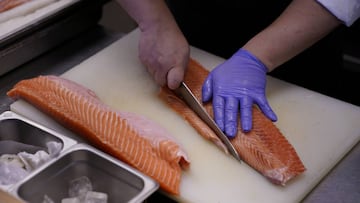What the WHO says about the transmission of coronavirus by food
The World Health Organization has stated that there is no scientific evidence that coronavirus can be transmitted by consuming food or the food chain.

Last week, it was reported that traces of coronavirus were found in cargoes of imported frozen food in three cities in China. Samples taken from the surface of a batch of frozen chicken wings imported from Brazil to Shenzhen, as well as samples of outer packaging of frozen Ecuadorian shrimp sold in Xian, tested positive for coronavirus, Chinese authorities said. It’s not the first time that China has discovered traces of the virus on imported food products. In June, 40 samples taken from Xinfadi market in Beijing were discovered to contain small traces of the virus – including one on a chopping board used for slicing salmon imported from Europe. That prompted the Chinese government to temporarily halt shipments of fresh salmon from the EU.
Coronavirus is inactivated by using hand sanitiser
Scientists have argued that there is no evidence to back up claims that coronavirus can be transmitted by frozen food, food packaging or the distribution of food products. Those claims were backed up on Thursday by the World Health Organization (WHO) who underlined that transmission of Covid-19 is through person-to-person contact or by direct contact with respiratory droplets from an infected person.
Speaking during Thursday’s press briefing in Geneva, Dr Maria Van Kerkhove explained, “We know that the virus can remain on surfaces for some time but the virus can be inactivated on our hands if you wash your hands or use alcohol-based rub and if the virus is actually in food - and we have no examples where this virus has been transmitted as foodborne, where someone has consumed a food product - the viruses can be killed. Other viruses as well can be killed if the meat is cooked”.
"People should not fear food"
Dr Mike Ryan, executive director of the WHO’s Emergencies Program added, “People should not fear food or food packaging or the processing or delivery of food. Food is very important and I would hate to think that we would create an impression that there's a problem with our food or there's a problem with our food chains. They're under enough pressure as it is already. We will continue to track findings like this but, as Maria said, there is no evidence that food or the food chain is participating in transmission of this virus and people should feel comfortable and feel safe.
“There are many other reasons why we need to protect and we need to cook our food properly and there are many other contaminants of food that occur but I think we should not be placing COVID as a risk in this area. I just think it's important that we don't conflate observations like this into a major concern around food. Our food from a COVID perspective is safe but there are many other reasons that we need to keep our food chain safe and many, many people work very, very hard across the world to ensure that our food is safe and of the highest quality”, he concluded.
See also
WHO sends experts to help South Africa in its battle with Covid-19
Pfizer and Moderna announce Covid-19 vaccine trials
"Covid is not of natural origin and did not emerge in Wuhan"





